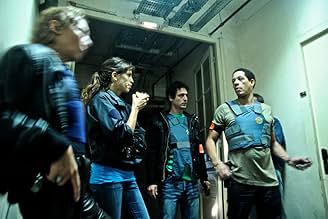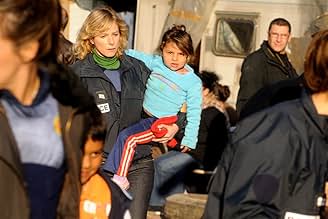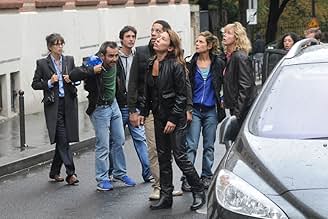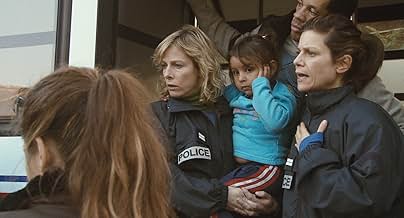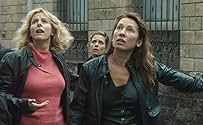Polisse
- 2011
- Tous publics
- 2h 7m
IMDb RATING
7.3/10
16K
YOUR RATING
A journalist covering police assigned to a juvenile division enters into an affair with one of her subjects.A journalist covering police assigned to a juvenile division enters into an affair with one of her subjects.A journalist covering police assigned to a juvenile division enters into an affair with one of her subjects.
- Awards
- 7 wins & 22 nominations total
Frédéric Pierrot
- Baloo
- (as Frederic Pierrot)
- Director
- Writers
- All cast & crew
- Production, box office & more at IMDbPro
Featured reviews
In Paris, the photographer Melissa (Maïwenn) is assigned by the Ministry of the Interior to document the daily activities of the BPM – the Police Division for Child Protection under the command of Chief Baloo (Frederic Pierrot).
Along the days, Melissa witnesses and takes photos of pedophiles, children and women abusers and abused and befriends the team of detectives, sharing their investigations along the working days and leaning how their jobs affect their private lives. Soon she has a love affair with the sensitive and emotive Detective Fred (Joeystarr).
"Polisse" is an entertaining French docudrama about a team of police officers responsible to protect children from abuses. The screenplay uses ellipsis and it seems that is based on true stories. It is good to see how the team works and their relationship outside the work, showing that the officers are human beings with families and problems affected by their work.
The weakest part is the character Melissa, with her touristic and unprofessional camera, and taking her glasses off and loosening her hair in a silly behavior. My vote is seven.
Title (Brazil): "Polissia" ("Polisse")
Along the days, Melissa witnesses and takes photos of pedophiles, children and women abusers and abused and befriends the team of detectives, sharing their investigations along the working days and leaning how their jobs affect their private lives. Soon she has a love affair with the sensitive and emotive Detective Fred (Joeystarr).
"Polisse" is an entertaining French docudrama about a team of police officers responsible to protect children from abuses. The screenplay uses ellipsis and it seems that is based on true stories. It is good to see how the team works and their relationship outside the work, showing that the officers are human beings with families and problems affected by their work.
The weakest part is the character Melissa, with her touristic and unprofessional camera, and taking her glasses off and loosening her hair in a silly behavior. My vote is seven.
Title (Brazil): "Polissia" ("Polisse")
The average time that someone can work in child protection is two years. Some last longer, or there would not be supervisors, but it is a rough business, as this film depicts.
What should grab you is that they move from case to case without any continuity. This is the real world of child protection. You deal with a druggie mother today, a pederast grandfather tomorrow, and neglected or abused children the next day.
Some may find the language off-putting, but that is the way it is. You are under such stress during work, that you have to relieve it somehow after you get off. It may be crude, but it is effective.
I can also relate to those who lose it occasionally. You can put your heart and soul into this job, and get frustrated easily by parents and the bureaucracy.
The film may have been actors, but it has a documentary feel as they portray the action as it really happens.
What should grab you is that they move from case to case without any continuity. This is the real world of child protection. You deal with a druggie mother today, a pederast grandfather tomorrow, and neglected or abused children the next day.
Some may find the language off-putting, but that is the way it is. You are under such stress during work, that you have to relieve it somehow after you get off. It may be crude, but it is effective.
I can also relate to those who lose it occasionally. You can put your heart and soul into this job, and get frustrated easily by parents and the bureaucracy.
The film may have been actors, but it has a documentary feel as they portray the action as it really happens.
Polisse is a difficult film to define. Based on real-life cases dealt with by the Child Protection Unit covering the 19th arrondissement (borough or quarter) of Paris, it could possibly be called a docudrama, although it does not cover events of historical significance.
Maïwenn, who wrote, directed and featured in the film as a photojournalist shadowing the unit, spent time herself with such a unit for research. All the cases featured in the film are supposed to have taken place while she was there or were recounted to her at that time. It is this that gives the film its lifelike, gritty quality. Indeed, the first scene plunges straight into an interview with a little girl who claims her father is molesting her, and is swiftly followed by other similar interviews with suspected paedophiles, victims and accusers. Despite the obviously very serious subject of the film, humorous moments pepper the script, which successfully highlights the tragicomic ludicrousness of some of the situations they encounter.
Alongside the cases of child molesting and underage rape that the team deals with on a day- to-day basis, the film delves into the complex personalities of the characters, who are at times tender and patient, and at others frustrated, angry and even violent. We are privy to the emotional strain the job has on these police officers and the effects on their personal lives, their marriages and relationships with their children. Special bonds also develop between them, and their intimacy and affinity is so well portrayed that it is easy to forget that this is in fact a film and not simply a documentary.
Though Polisse, like real life, does not really follow a plot line, and we never find out if the criminals are actually brought to justice, one does not become bored or frustrated or ever wonder where the film is going. In fact, just like the TV series The Wire to which it has been compared, it is the lack of obvious direction of the film that ultimately makes it all the more powerful and effective.
Maïwenn, who wrote, directed and featured in the film as a photojournalist shadowing the unit, spent time herself with such a unit for research. All the cases featured in the film are supposed to have taken place while she was there or were recounted to her at that time. It is this that gives the film its lifelike, gritty quality. Indeed, the first scene plunges straight into an interview with a little girl who claims her father is molesting her, and is swiftly followed by other similar interviews with suspected paedophiles, victims and accusers. Despite the obviously very serious subject of the film, humorous moments pepper the script, which successfully highlights the tragicomic ludicrousness of some of the situations they encounter.
Alongside the cases of child molesting and underage rape that the team deals with on a day- to-day basis, the film delves into the complex personalities of the characters, who are at times tender and patient, and at others frustrated, angry and even violent. We are privy to the emotional strain the job has on these police officers and the effects on their personal lives, their marriages and relationships with their children. Special bonds also develop between them, and their intimacy and affinity is so well portrayed that it is easy to forget that this is in fact a film and not simply a documentary.
Though Polisse, like real life, does not really follow a plot line, and we never find out if the criminals are actually brought to justice, one does not become bored or frustrated or ever wonder where the film is going. In fact, just like the TV series The Wire to which it has been compared, it is the lack of obvious direction of the film that ultimately makes it all the more powerful and effective.
An authentic gem. A real one. Not a thriller nor a crime movie. Actually, this amazing feature reminds me Xavier Beauvois' LE PETIT LIEUTENANT, released in 2005. The real picture, poignant, terrific life of the daily procedural life of cops. Here, it is the child protection squad; a bunch of men and women who fight against child molesters, people who sometimes rape their own children !!! Policemen and women who have to face the ugliness, the most disgusting side of the real life. In this film, you cry, laugh, feel your heart under pressure when watching this wonderful performance given by the actors, so close to reality. Yes, the characters, and not only the cops, look real ones. A powerful, vivid movie that may give you the feeling to be hit by an express train.
The ending is really awful, but I won't tell you more. Go and see this masterpiece. Now!!!
The ending is really awful, but I won't tell you more. Go and see this masterpiece. Now!!!
now that is a good film..too much talk in the dialog, which is famous in the french cinema and drama in general ,but this time it was well used i was not bothered by it,it's stayed real,and dealing with a true realistic problem without exaggeration, presenting it as is- i felt like as if its a reality drama ,that a hidden camera was shooting a real life events not drama,that is success,the film is deep and subtle and its emotional too,acting is very well carried out... even by the minors who were interviewed and the children,i must emphasis on" Maïwenn's" acting ,it was very calm yet deep and superb."Joey starr" was good too in some moments though he was exaggerating in anger in others but over all good acting i say if you have a chance to go watch this film, please do it s worth it really.
Did you know
- TriviaDirector Maïwenn's first idea for the title was "Police", but another film already had this name: none other than famous French director Maurice Pialat's film in 1985. Her next idea was, "Vous êtes de la police?", but it too was already a film title. One day, as her young child was learning to write, he misspelled "Police", and she saw in front of her eyes the perfect title considering the subject of her movie, with a child's writing: "Polisse".
- ConnectionsFeatured in Ebert Presents: At the Movies: Episode #1.18 (2011)
- SoundtracksL'Île aux Enfants
Music by Roger Pouly
Lyrics by Christophe Izard
Performed by Anne Germain
(p) & (c) 1974 Editions de Alouettes (catalogue Technisonor)
Avec l'aimable autorisation de Sony ATV
- How long is Polisse?Powered by Alexa
Details
- Release date
- Country of origin
- Official sites
- Languages
- Also known as
- Cánh Sát Pháp
- Filming locations
- Boulevard du Palais, Paris 1, Paris, France(scene at the café)
- Production companies
- See more company credits at IMDbPro
Box office
- Gross US & Canada
- $211,440
- Opening weekend US & Canada
- $16,568
- May 20, 2012
- Gross worldwide
- $20,601,245
- Runtime2 hours 7 minutes
- Color
- Sound mix
- Aspect ratio
- 1.85 : 1
Contribute to this page
Suggest an edit or add missing content




